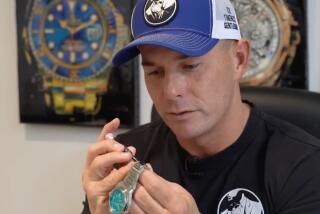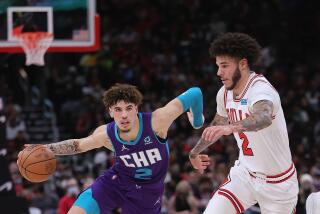Ex-Football Player Is at Top of Sales Game
- Share via
OAK PARK, Mich. — When Mel Farr arrived at training camp for the Detroit Lions in 1967, the first book he read was about how to become a millionaire.
Lying in bed on the nights before games, he talked to his roommate about how his fortune could be made--not in football, but in the auto industry. After practices, he attended night classes to earn his college degree. In the off-season, he worked at Ford Motor Co.
Though by becoming a professional football player Farr was fulfilling the goal he had set at age 12, he also knew that those days wouldn’t last forever. So at age 23, on the verge of a successful pro career, the son of an auto dealer set another goal.
“As an African American, I could see being an auto dealer,” Farr says. “As an African American, I could not see being a coach in the National Football League, because there weren’t any.”
Three decades later, the 53-year-old Farr has built the nation’s largest black auto dealership with businesses in Michigan, Ohio, Texas, Maryland and New Jersey. He appears in television commercials as the caped Mel Farr Superstar, recently opened his first used car “superstore,” and even joined Donald Trump to bid for one of Detroit’s gambling licenses.
“Mel Farr is fantastic. There’s nobody like him,” Trump says. “I was originally drawn just by reputation--now I can see that the reputation is well founded.”
Farr says all he’s done is change playing fields.
“It takes an extreme amount of effort to go out there and apply your training on the football field. It takes an extreme amount of effort to be an African American and be very successful at this thing,” he says.
Making that effort--and running for goals--is something Farr has been doing most of his life.
On the way, he’s never let others tell him to stop doing what he does best. His mother didn’t want her children playing football, but that didn’t stop Farr or his brother, Miller, who also went on to play for the Lions.
The auto industry also was a big part of family life in Beaumont, Texas. Farr worked with his father selling cars at Farr’s New and Used.
A typical family outing would be spent at a car lot checking out the competition’s prices. There also were trips to the junkyard to find fixer-uppers that could be sold for a profit.
In the office at his Oak Park dealership--the first Ford franchise he bought in the mid-1970s--a copy of his father’s business license dated July 8, 1960, sits framed on a shelf.
“The car business has been in my blood all my life,” Farr says.
But football, at least indirectly, got him closer to the top of that business. After he earned All America honors at UCLA, the team that picked him as its first choice in the 1967 NFL draft was Detroit--home of the auto industry. And even better, the team owner was a Ford family member, meaning Farr came into contact with company executives who helped him enter the business.
Farr led the Lions in rushing, receiving and scoring in his first season, and made two Pro Bowl appearances.
“You could tell he was a very intense person, intelligent,” says Joe Schmidt, the Lions head coach who drafted Farr. “Mel was a great football player.”
But injuries slowed him down. In his second season he had knee problems, followed by operations and later shoulder problems.
He kept playing. But he also kept working on his other goal.
“He knew that football wasn’t going to be what he was going to do for the rest of his life,” says Charlie Sanders, a tight end who played with Farr and went on to become a Lions assistant coach.
Since he hadn’t completed the courses to earn his political science degree at UCLA, he attended night classes at the University of Detroit to get a bachelor’s degree.
He also decided to get serious about his employment in the off-season. So he went to Ford Motor Co. and was offered a choice: a well-paying job doing public relations for the company’s racing team, or a job in the dealer development division that paid $200 a week.
The public relations job would last only as long as Farr was a marketable celebrity. He went with the safer choice.
“I wanted a career after football,” he says. “I didn’t want to have two short-lived careers.”
And in what he says was another stroke of luck, he joined Ford in 1968, just one year after the company opened its first black-owned dealership. Farr became involved with projects to recruit black dealers and help them sell cars.
He continued to work in his days off practice and in the off-season. After seven years, he left the NFL when there was talk of a trade. He bought his first dealership in 1975 with a partner.
The dealership was named “Mel Farr Superstar,” because it rhymed.
“Mel Farr Superstar for a far better deal,” Farr sings.
But it was a rough start. Farr worked hard, putting in 18-hour days. And he eventually bought out the partner, with whom he had different management philosophy.
In 1980, Farr appeared with Lions player Billy Sims in a commercial. They were both running backs, and the ads talked about “running back” the prices on cars, featuring Farr rattling off car prices in the auctioneer-like style of auto dealers.
Sims then said since they were both superstars, they should fly.
“Superheroes--they fly,” Farr simply explains.
The first ads featured them in business suits flying through the air, eventually leading to the caped Farr hawking the latest models. His commercials today also feature a clay-animated “Little Mel,” whose falsetto is performed by the Big Mel.
“I’m going to do whatever it takes to sell customers cars,” Farr says.
One ad for Farr’s Ford dealership in Fairfield, Ohio, doesn’t show the smiling Farr speaking with his Texas drawl. Instead, they see Tom Force--who is white, shorter, and doesn’t have the athlete’s physique that Farr still maintains. He never says he is Mel Farr, but never says that he isn’t.
It’s the only dealership where Farr himself doesn’t appear in television ads, and Farr says he does it because of the community’s racial makeup.
“Tom’s good for the market,” he explains.
He does strive to employ minorities, and says he’s hired blacks in areas where dealerships haven’t had a single black person on the staff before.
The advertising building that Farr built on his used car lot, complete with a television studio for the commercials, might in the future be used to help other minority car dealers market themselves.
“Hopefully in my efforts I can have a positive influence on the whole business industry that you give a guy a fair opportunity and he can get the job done,” he says.
Farr’s company, Oak Park-based Mel Farr Automotive Group, had $503.3 million in sales last year. That figure, a 31.8% increase from the year before, leapfrogged the company from No. 3 to No. 1 on Black Enterprise magazine’s list of top black auto dealers and put Farr more than $100 million ahead of the No. 2 dealer.
More to Read
Inside the business of entertainment
The Wide Shot brings you news, analysis and insights on everything from streaming wars to production — and what it all means for the future.
You may occasionally receive promotional content from the Los Angeles Times.










